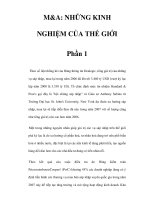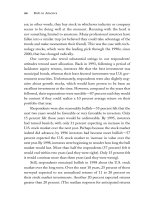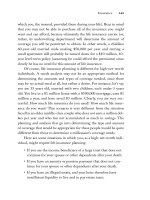A FAIR GLOBALIZATION: CREATING OPPORTUNITIES FOR ALL phần 1 pot
Bạn đang xem bản rút gọn của tài liệu. Xem và tải ngay bản đầy đủ của tài liệu tại đây (225.69 KB, 19 trang )
A FAIR GLOBALIZATION:
CREATING OPPORTUNITIES FOR ALL
Prelims Page i Friday, April 16, 2004 2:36 PM
Prelims Page ii Friday, April 16, 2004 2:36 PM
A FAIR GLOBALIZATION:
CREATING OPPORTUNITIES FOR ALL
World Commission on the Social
Dimension of Globalization
Prelims Page iii Friday, April 16, 2004 2:36 PM
ISBN 92-2-115426-2
First published February 2004
Reprinted April 2004
The designations employed in ILO publications, which are in conformity with United Nations
practice, and the presentation of material therein do not imply the expression of any opinion
whatsoever on the part of the International Labour Office concerning the legal status of any country,
area or territory or of its authorities, or concerning the delimitation of its frontiers.
Reference to names of firms and commercial products and processes does not imply their en-
dorsement by the International Labour Office, and any failure to mention a particular firm, com-
mercial product or process is not a sign of disapproval.
ILO publications can be obtained through major booksellers or ILO local offices in many countries,
or direct from ILO Publications, International Labour Office, CH-1211 Geneva 22, Switzerland.
Catalogues or lists of new publications are available free of charge from the above address.
Photocomposed by the International Labour Office, Geneva, Switzerland DTP
Printed in Switzerland ATA
Prelims Page iv Friday, April 16, 2004 2:36 PM
The World Commission on the Social Dimension of Globalization
The World Commission on the Social Dimension of Globalization
v
The World Commission on the Social Dimension of Globalization
Co-Chairs: H.E. Ms. Tarja Halonen, President of the Republic of Finland
H.E. Mr. Benjamin William Mkapa, President of the United Republic of Tanzania
Members: Giuliano Amato
Ruth Cardoso
Heba Handoussa
Eveline Herfkens
Ann McLaughlin Korologos
Lu Mai
Valentina Matvienko
Deepak Nayyar
Taizo Nishimuro
François Perigot
Surin Pitsuwan
Julio Maria Sanguinetti
Hernando de Soto
Joseph Stiglitz
John J. Sweeney
Victoria Tauli-Corpuz
Aminata D. Traoré
Zwelinzima Vavi
Ernst Ulrich von Weizsaecker
Ex officio
members: Bill Brett
Eui-yong Chung
Daniel Funes de Rioja
Juan Somavia
Alain Ludovic Tou
Prelims Page v Friday, April 16, 2004 2:36 PM
Prelims Page vi Friday, April 16, 2004 2:36 PM
Preface
vii
PREFACE
Preface
In his address to the United Nations General Assembly on 23 September 2003, the
United Nations Secretary-General, Kofi Annan, succinctly warned the world body that it
had “come to a fork in the road.” We, the Co-Chairs of the World Commission on the Social
Dimension of Globalization, believe the world stands at a historic moment of decision.
The Commission was established to address some of the challenges facing the world
as it stands at this fork. As human beings, it is in our power to take a correct turn, which
would make the world safer, fair, ethical, inclusive and prosperous for the majority, not just
for a few, within countries and between countries. It is also in our power to prevaricate, to
ignore the road signs, and let the world we all share slide into further spirals of political
turbulence, conflicts and wars.
We believe we have in these following pages enough of the case for political leaders,
nationally and internationally, to be persuaded to take the correct turn.
Currently, globalization is a divisive subject. It verges on a dialogue of the deaf, both
nationally and internationally. Yet the future of our countries, and the destiny of our globe,
demands that we all rethink globalization. This report is timely. The debate is changing. Old
convictions and ideologies have been tested by experience, and changed by example.
People are open to a fresh start. Now is the time for leadership, to move from sterile debate
to positive action.
We believe that, in this report, we have looked at globalization through the eyes of
the people, rising above our constituencies and capturing faithfully the hopes and fears of
our shared humanity. Many recognize the opportunities for a better life that globalization
presents. We believe their hopes are realizable, but only if globalization is subjected to bet-
ter governance at all levels. More people than ever before do not want to be left behind by
the globalization train; but they want to be sure where it is heading, and that it is travelling
at survivable speed.
Our driving spirit has been to make globalization a positive force for all people
and countries. We propose no panaceas or simple solutions; instead we suggest a new
perspective.
We believe the dominant perspective on globalization must shift more from a narrow
preoccupation with markets to a broader preoccupation with people. Globalization must
be brought from the high pedestal of corporate board rooms and cabinet meetings to meet
the needs of people in the communities in which they live. The social dimension of global-
ization is about jobs, health and education – but it goes far beyond these. It is the dimension
of globalization which people experience in their daily life and work: the totality of their
aspirations for democratic participation and material prosperity. A better globalization is
the key to a better and secure life for people everywhere in the 21st century.
We also propose a process by which such a perspective can be realized at all levels,
beginning with empowered local communities and improved and more accountable
national governance; fair global rules applied fairly; and global institutions that are more
pro-people.
We propose a series of actions – each small in themselves. Yet taken together they
will set in train a process to achieve this goal by stimulating and energizing the networks
of people and ideas and the economic and social interactions of globalization itself.
Our experience working in the Commission makes us confident of the future. The
Commission is a microcosm of the very wide diversity of opinion, concerns and perspec-
tives of the real world. We come from some of the wealthiest and poorest countries. We
comprise trade unionists and corporate leaders, parliamentarians and presidents, leaders of
indigenous peoples and women’s activists, scholars and government advisors. We have
seen, in the course of our work, how divergent positions can be spanned and how common
interests can lead to common action through dialogue.
Prelims Page vii Friday, April 16, 2004 2:36 PM
viii
A fair globalization: Creating opportunities for all
The Commission was established by the ILO. It had full and independent responsibil-
ity for its Report, and members of the Commission served in their individual capacity. The
members of the Commission do not each subscribe to every statement in the text, but they
endorse the Report as a whole to stimulate a wider process of public dialogue and common
endeavour which will promote a fair and inclusive globalization.
It was a great pleasure and a uniquely enriching experience for us, the Co-Chairs, to
work with a Commission composed of such a distinguished, thoroughly committed and
energetic group of global citizens. We thank them wholeheartedly for their dedication,
contribution and cooperation. We thank the very capable Secretariat that served us so well.
And we are grateful to the ILO for the decision to constitute such a Commission and to hon-
our us with the historic responsibility to chair it.
To the world, and especially to political and corporate leaders everywhere, we
present these pointers to a better globalization, a better future for people – all people.
Tarja Halonen
Benjamin William Mkapa
President of the Republic of Finland; President of the United Republic
Co-Chair of Tanzania; Co-Chair
Prelims Page viii Friday, April 16, 2004 2:36 PM
Synopsis
ix
SYNOPSIS
Introduction
Our remit, the Social Dimension of Globalization, is a vast and complex one. As a
Commission we were broadly representative of the diverse and contending actors and
interests that exist in the real world. Co-chaired by two serving Heads of State, a woman
and a man, from North and South, we came from countries in different parts of the world
and at all stages of development. Our affiliations were equally diverse: government,
politics, parliaments, business and multinational corporations, organized labour, academia
and civil society.
Yet, through a spirit of common purpose, we arrived at the shared understandings
that are before you. As a collective document it is quite different from alternative reports
each one of us would have written individually. But our experience has demonstrated the
value and power of dialogue as an instrument for change. Through listening patiently and
respectfully to diverse views and interests we found common ground.
Synopsis
We were spurred on by the realization that action to build a fair and inclusive process
of globalization was urgent. This could only happen in the future through forging agree-
ments among a broad spectrum of actors on the course for action. We are convinced that
our experience can and should be replicated on a larger and wider scale, expanding the
space for dialogue aimed at building consensus for action.
A vision for change
Public debate on globalization is at an impasse. Opinion is frozen in the ideological
certainties of entrenched positions and fragmented in a variety of special interests. The will
for consensus is weak. Key international negotiations are deadlocked and international
development commitments go largely unfulfilled.
The report before you offers no miraculous or simple solutions, for there are none.
But it is an attempt to help break the current impasse by focusing on the concerns and
aspirations of people and on the ways to better harness the potential of globalization itself.
Ours is a critical but positive message for changing the current path of globalization.
We believe the benefits of globalization can be extended to more people and better shared
between and within countries, with many more voices having an influence on its course.
The resources and the means are at hand. Our proposals are ambitious but feasible. We are
certain that a better world is possible.
We seek a process of globalization with a strong social dimension based on univer-
sally shared values, and respect for human rights and individual dignity; one that is fair,
inclusive, democratically governed and provides opportunities and tangible benefits for all
countries and people.
To this end we call for:
•
A focus on people.
The cornerstone of a fairer globalization lies in meeting the
demands of all people for: respect for their rights, cultural identity and autonomy;
decent work; and the empowerment of the local communities they live in. Gender
equality is essential.
•
A democratic and effective State.
The State must have the capability to manage inte-
gration into the global economy, and provide social and economic opportunity and
security.
•
Sustainable development.
The quest for a fair globalization must be underpinned by
the interdependent and mutually reinforcing pillars of economic development, social
development and environmental protection at the local, national, regional and global
levels.
Prelims Page ix Friday, April 16, 2004 2:36 PM
x
A fair globalization: Creating opportunities for all
•
Productive and equitable markets.
This requires sound institutions to promote
opportunity and enterprise in a well-functioning market economy.
•
Fair rules.
The rules of the global economy must offer equitable opportunity and
access for all countries and recognize the diversity in national capacities and develop-
mental needs.
•
Globalization with solidarity.
There is a shared responsibility to assist countries and
people excluded from or disadvantaged by globalization. Globalization must help to
overcome inequality both within and between countries and contribute to the elimin-
ation of poverty.
•
Greater accountability to people.
Public and private actors at all levels with power
to influence the outcomes of globalization must be democratically accountable for
the policies they pursue and the actions they take. They must deliver on their com-
mitments and use their power with respect for others.
•
Deeper partnerships.
Many actors are engaged in the realization of global social
and economic goals – international organizations, governments and parliaments,
business, labour, civil society and many others. Dialogue and partnership among
them is an essential democratic instrument to create a better world.
•
An effective United Nations.
A stronger and more efficient multilateral system is the
key instrument to create a democratic, legitimate and coherent framework for globali-
zation.
Globalization and its impact
Globalization has set in motion a process of far-reaching change that is affecting
everyone. New technology, supported by more open policies, has created a world more
interconnected than ever before. This spans not only growing interdependence in eco-
nomic relations – trade, investment, finance and the organization of production globally –
but also social and political interaction among organizations and individuals across the
world.
The potential for good is immense. The growing interconnectivity among people
across the world is nurturing the realization that we are all part of a global community. This
nascent sense of interdependence, commitment to shared universal values, and solidarity
among peoples across the world can be channelled to build enlightened and democratic
global governance in the interests of all. The global market economy has demonstrated
great productive capacity. Wisely managed, it can deliver unprecedented material
progress, generate more productive and better jobs for all, and contribute significantly to
reducing world poverty.
But we also see how far short we still are from realizing this potential. The current
process of globalization is generating unbalanced outcomes, both between and within
countries. Wealth is being created, but too many countries and people are not sharing in
its benefits. They also have little or no voice in shaping the process. Seen through the eyes
of the vast majority of women and men, globalization has not met their simple and legiti-
mate aspirations for decent jobs and a better future for their children. Many of them live in
the limbo of the informal economy without formal rights and in a swathe of poor countries
that subsist precariously on the margins of the global economy. Even in economically suc-
cessful countries some workers and communities have been adversely affected by global-
ization. Meanwhile the revolution in global communications heightens awareness of these
disparities.
A strategy for change
These global imbalances are morally unacceptable and politically unsustainable. What
is required to change this is not the realization of a Utopian blueprint in one swoop. Rather
Prelims Page x Friday, April 16, 2004 2:36 PM
Synopsis
xi
it is a series of coordinated changes across a broad front, ranging from reform of parts of
the global economic system to strengthening governance at the local level. All this should
and can be achieved in the context of open economies and open societies. Though inter-
ests diverge, we believe that there is increasing convergence of opinion throughout the
world on the need for a fair and inclusive process of globalization.
We have formulated a wide-ranging set of recommendations to realize this. Given the
necessary political will, immediate action is feasible on some trade and financial issues that
have been the subject of protracted multilateral negotiations and discussion in policy
circles. On these issues, the required course of action is clear but the urgent need for
change has not yet dawned on some major players. Here continued advocacy and a
stronger public opinion is essential to carry the proposals forward. Advocacy to prepare
the ground for the consideration of new issues will also be important. But on these newer
issues, such as the development of a multilateral framework for the cross-border movement
of people or the accountability of international organizations, the prime lever for the
decision to act is broad-based dialogue among State and non-State actors. Through this, con-
sensus and resolve can be forged on what needs to be done, how, and by whom.
The governance of globalization
We judge that the problems we have identified are not due to globalization as such
but to deficiencies in its governance. Global markets have grown rapidly without the
parallel development of economic and social institutions necessary for their smooth and
equitable functioning. At the same time, there is concern about the unfairness of key global
rules on trade and finance and their asymmetric effects on rich and poor countries.
An additional concern is the failure of current international policies to respond ade-
quately to the challenges posed by globalization. Market opening measures and financial
and economic considerations predominate over social ones. Official Development Assist-
ance (ODA) falls far short of the minimum amounts required even for achieving the Mil-
lennium Development Goals (MDGs) and tackling growing global problems. The
multilateral system responsible for designing and implementing international policies is
also under-performing. It lacks policy coherence as a whole and is not sufficiently demo-
cratic, transparent and accountable.
These rules and policies are the outcome of a system of global governance largely
shaped by powerful countries and powerful players. There is a serious democratic deficit
at the heart of the system. Most developing countries still have very limited influence in
global negotiations on rules and in determining the policies of key financial and economic
institutions. Similarly, workers and the poor have little or no voice in this governance
process.
Beginning at home
There is thus a wide range of issues to be addressed at the global level. But this alone
will not suffice. Global governance is not a lofty, disembodied sphere. It is merely the apex
of a web of governance that stretches from the local level upwards. The behaviour of nation
States as global actors is the essential determinant of the quality of global governance. Their
degree of commitment to multilateralism, universal values and common goals, the extent
of their sensitivity to the cross-border impact of their policies, and the weight they attach
to global solidarity are all vital determinants of the quality of global governance. At the same
time, how they manage their internal affairs influences the extent to which people will
benefit from globalization and be protected from its negative effects. In this important
sense the response to globalization can be said to begin at home. This reflects the simple
but crucial fact that people live locally within nations.
Prelims Page xi Friday, April 16, 2004 2:36 PM
xii
A fair globalization: Creating opportunities for all
We therefore anchor our analysis at the national level. We do not, of course, presume
to make specific recommendations for all the greatly diverse countries of the world. Rather,
we set out the broad goals and principles that can guide policy to deal more effectively with
the social dimension of globalization, fully recognizing that their implementation must
respond to the needs and specific conditions of each country. From this perspective it is
clear that national governance needs to be improved in all countries, albeit more radically
in some than in others. There is wide international agreement on the essentials which we
must all urgently strive for:
• good political governance based on a democratic political system, respect for human
rights, the rule of law and social equity.
• an effective State that ensures high and stable economic growth, provides public
goods and social protection, raises the capabilities of people through universal access
to education and other social services, and promotes gender equity.
•a vibrant civil society, empowered by freedom of association and expression, that
reflects and voices the full diversity of views and interests. Organizations represent-
ing public interests, the poor and other disadvantaged groups are also essential for
ensuring participatory and socially just governance.
• strong representative organizations of workers and employers are essential for fruitful
social dialogue.
The highest priority must be given to policies to meet the central aspiration of
women and men for decent work; to raise the productivity of the informal economy and to
integrate it into the economic mainstream; and to enhance the competitiveness of enter-
prises and economies.
Policy must focus squarely on meeting peoples’ needs where they live and work. It is
thus essential to nurture local communities through the devolution of power and resources
and through strengthening local economic capabilities, cultural identity, and respecting
the rights of indigenous and tribal peoples.
Nation States should also strengthen regional and sub-regional cooperation as a major
instrument for development and for a stronger voice in the governance of globalization.
They should reinforce the social dimension of regional integration.
Reform at the global level
At the global level, we have more specific recommendations to make. Some key ones
are highlighted below.
Global rules and policies on trade and finance must allow more space for policy
autonomy in developing countries. This is essential for developing policies and institutional
arrangements best suited to their level of development and specific circumstances. Existing
rules that unduly restrict their policy options for accelerating agricultural growth and
industrialization and for maintaining financial and economic stability need to be reviewed.
New rules must also respect this requirement. The policies of international organizations
and donor countries must also shift more decisively away from external conditionality to
national ownership of policies. Affirmative action provisions in favour of countries that do
not have the same capabilities as those who developed earlier need to be strengthened.
Fair rules for trade and capital flows need to be complemented by fair rules for the
cross-border movement of people. International migratory pressures have increased and
problems such as trafficking in people and the exploitation of migrant workers have inten-
sified. Steps have to be taken to build a multilateral framework that provides uniform and
transparent rules for the cross-border movement of people and balances the interests of
both migrants themselves and of countries of origin and destination. All countries stand to
benefit from an orderly and managed process of international migration that can enhance
global productivity and eliminate exploitative practices.
Prelims Page xii Friday, April 16, 2004 2:36 PM
Synopsis
xiii
Global production systems have proliferated, generating the need for new rules on
Foreign Direct Investment (FDI) and on competition. A balanced and development-friendly
multilateral framework for FDI, negotiated in a generally accepted forum, will benefit all
countries by promoting increased direct investment flows while limiting the problems of
incentive competition which reduce the benefits from these flows. Such a framework
should balance private, workers’ and public interests, as well as their rights and responsi-
bilities. Cooperation on cross-border competition policy will make global markets more
transparent and competitive.
Core labour standards as defined by the ILO provide a minimum set of global rules for
labour in the global economy and respect for them should be strengthened in all countries.
Stronger action is required to ensure respect for core labour standards in Export Processing
Zones (EPZs) and, more generally, in global production systems. All relevant international
institutions should assume their part in promoting these standards and ensure that no
aspect of their policies and programmes impedes implementation of these rights.
The multilateral trading system should substantially reduce unfair barriers to market
access for goods in which developing countries have comparative advantage, especially
textiles and garments and agricultural products. In doing so, the interests of the Least
Developed Countries (LDCs) should be safeguarded through special and differential treat-
ment to nurture their export potential.
A minimum level of social protection for individuals and families needs to be accepted
and undisputed as part of the socio-economic ‘floor’ of the global economy, including
adjustment assistance to displaced workers. Donors and financial institutions should con-
tribute to the strengthening of social protection systems in developing countries.
Greater market access is not a panacea. A more balanced strategy for sustainable glo-
bal growth and full employment, including an equitable sharing among countries of the
responsibility for maintaining high levels of effective demand in the global economy, is
essential. Enhanced coordination of macroeconomic policies among countries to this end
is a key requirement. A successful global growth strategy will ease economic tensions
among countries and make market access for developing countries easier to achieve.
Decent Work for all should be made a global goal and be pursued through coherent
policies within the multilateral system. This would respond to a major political demand in
all countries and demonstrate the capacity of the multilateral system to find creative solu-
tions to this critical problem.
The international financial system should be made more supportive of sustainable glo-
bal growth. Cross-border financial flows have grown massively but the system is unstable,
prone to crises and largely bypasses poor and capital scarce countries. Gains in the spheres
of trade and FDI cannot be fully reaped unless the international financial system is reformed
to achieve greater stability. In this context developing countries should be permitted to
adopt a cautious and gradual approach to capital account liberalization and more socially
sensitive sequencing of adjustment measures in response to crises.
A greater effort is required to mobilize more international resources to attain key glo-
bal goals, particularly the MDGs. The 0.7 per cent target for ODA must be met and new
sources for funding over and above this target should be actively explored and developed.
The implementation of reforms in international economic and social policy will
require worldwide political support, the commitment of key global actors, and the
strengthening of global institutions. The UN multilateral system constitutes the core of glo-
bal governance and is uniquely equipped to spearhead the process of reform. For it to cope
with the current and emerging challenges of globalization it has to enhance its effective-
ness and improve the quality of its governance, especially with respect to democratic rep-
resentation and decision-making, accountability to people, and policy coherence.
We call on developed countries to reconsider their decision to maintain zero nominal
growth in their mandated contributions to the UN system. It is essential that the inter-
national community agree to increase financial contributions to the multilateral system and
Prelims Page xiii Friday, April 16, 2004 2:36 PM
xiv
A fair globalization: Creating opportunities for all
reverse the trend towards raising voluntary contributions at the expense of mandatory
ones.
Heads of State and Government should ensure that the policies pursued by their
countries in international fora are coherent and focus on the well-being of people.
Parliamentary oversight of the multilateral system at the global level should be pro-
gressively expanded. We propose the creation of a Parliamentary Group concerned with
the coherence and consistency between global economic, social and environmental pol-
icies, which should develop an integrated oversight of major international organizations.
A critical requirement for better global governance is that all organizations, including
UN agencies, should become more accountable to the public at large for the policies they
pursue. National parliaments should contribute to this process by regularly reviewing deci-
sions taken by their countries’ representatives to these organizations.
Developing countries should have increased representation in the decision-making
bodies of the Bretton Woods Institutions, while the working methods in the World
Trade Organization (WTO) should provide for their full and effective participation in its
negotiations.
Greater voice should be given to non-State actors, especially representative organ-
izations of the poor.
The contributions of business, organized labour, civil society organizations (CSOs),
and of knowledge and advocacy networks to the social dimension of globalization should
be strengthened.
Responsible media can play a central role in facilitating a movement towards a fairer
and more inclusive globalization. Well-informed public opinion on issues raised in this
Report is essential to underpin change. Policies everywhere therefore need to emphasize
the importance of diversity in information and communication flows.
Mobilizing action for change
We believe that broad-based dialogue on our recommendations, especially on issues
that are not currently being negotiated on the global agenda, is the essential first step in
mobilizing action for change. It is of primary importance that such dialogue begins at the
national level in order to construct the foundations of the necessary consensus and political
will.
At the same time the multilateral system has to play a pivotal role in carrying forward
reforms at the global level. We propose a new operational tool for upgrading the quality of
policy coordination between international organizations on issues in which the implemen-
tation of their mandates intersect and their policies interact. Policy Coherence Initiatives
should be launched by the relevant international organizations to develop more balanced
policies for achieving a fair and inclusive globalization. The objective would be to progres-
sively develop integrated policy proposals that appropriately balance economic, social, and
environmental concerns on specific issues. The first initiative should address the question
of global growth, investment, and employment creation and involve relevant UN bodies,
the World Bank, the International Monetary Fund (IMF), the WTO, and the ILO. Priority
areas for other such initiatives include gender equality and the empowerment of women;
education; health; food security; and human settlements.
A series of multi-stakeholder Policy Development Dialogues should also be organized
by relevant international organizations to further consider and develop key policy pro-
posals – such as a multilateral framework for the cross-border movement of people, a devel-
opment framework for FDI, the strengthening of social protection in the global economy,
and new forms of accountability of international organizations.
A Globalization Policy Forum should be organized by the UN and its specialized agen-
cies to review on a regular and systematic basis the social impact of globalization. Partici-
pating organizations could produce a periodic ‘State of Globalization Report’.
Prelims Page xiv Friday, April 16, 2004 2:36 PM
Synopsis
xv
Our proposals call for a wider and more democratic participation of people and coun-
tries in the making of policies that affect them. And they also require those with the cap-
acity and power to decide – governments, parliaments, business, labour, civil society and
international organizations – to assume their common responsibility to promote a free,
equitable and productive global community.
Prelims Page xv Friday, April 16, 2004 2:36 PM
Prelims Page xvi Friday, April 16, 2004 2:36 PM
Acronyms and abbreviations
xvii
ACRONYMS AND ABBREVIATIONS
Acronyms and abbreviations
AIDS Acquired Immune Deficiency Syndrome
APEC Asia and Pacific Economic Cooperation
AU African Union
BIT Bilateral Investment Treaty
CSO Civil Society Organization
CSR Corporate Social Responsibility
ECOSOC United Nations Economic and Social Council
EPZ Export Processing Zone
EU European Union
FAO Food and Agriculture Organization of the United Nations
FDI Foreign Direct Investment
FSA Financial Sector Assessment
G7 Group of 7
G8 Group of 8
G10 Group of 10
G77 Group of 77
GATS General Agreement on Trade and Services
GATT General Agreement on Tariffs and Trade
GAVI Global Alliance for Vaccines and Immunization
GDLN Global Distance Learning Network
GDP Gross Domestic Product
GSP Generalized System of Preferences
HIPC Debt Initiative for Heavily Indebted Poor Countries
HIV Human Immunodeficiency Virus
ICC International Chamber of Commerce
ICFTU International Confederation of Free Trade Unions
ICT Information and Communications Technology
IFAD International Fund for Agricultural Development
IFF International Financing Facility
IFIs International Financial Institutions
IMF International Monetary Fund
ILO International Labour Organization
IOE International Organisation of Employers
IOM International Organization for Migration
IPRs Intellectual Property Rights
IPU Inter-Parliamentary Union
IT Information Technology
ITU International Telecommunications Union
LDCs Least Developed Countries
MAI Multilateral Agreement on Investment
Prelims Page xvii Friday, April 16, 2004 2:36 PM
xviii
A fair globalization: Creating opportunities for all
MDGs Millennium Development Goals
Mercosur Southern Cone Common Market
MNEs Multinational Enterprises
NAFTA North American Free Trade Agreement
NEPAD New Partnership for African Development
NGO Non-governmental Organization
NIE Newly Industrializing Economy
ODA Official Development Assistance
OECD Organization for Economic Cooperation and Development
OHCHR Office of the High Commissioner for Human Rights
PRSP Poverty Reduction Strategy Papers
R&D Research and Development
ROSC Review of Standards and Codes
SADC Southern African Development Community
SCM Subsidies and Countervailing Measures
SDRs Special Drawing Rights
SMEs Small and Medium-sized Enterprises
SRI Socially Responsible Investment
TPRM Trade Policy Review Mechanism
TRIMs Trade-Related Investment Measures
TRIPS Trade-Related Aspects of Intellectual Property Rights
UN United Nations
UNCTAD United Nations Conference on Trade and Development
UNDP United Nations Development Programme
UNEP United Nations Environment Programme
UNESCO United Nations Educational, Scientific and Cultural Organization
UNHCR United Nations High Commissioner for Refugees
UNIDO United Nations Industrial Development Organization
UNIFEM United Nations Development Fund for Women
UNODC United Nations Office on Drugs and Crime
WCL World Confederation of Labour
WHO World Health Organization
WTO World Trade Organization
Prelims Page xviii Friday, April 16, 2004 2:36 PM
Contents
xix
CONTENTS
Contents
Part I: Globalization for people: A vision for change
Where do we stand today? . . . . . . . . . . . . . . . . . . . . . . . . . . . . . . . 3
Where do we want to go? . . . . . . . . . . . . . . . . . . . . . . . . . . . . . . . . 5
How do we get there? . . . . . . . . . . . . . . . . . . . . . . . . . . . . . . . . . . . 5
A stronger ethical framework . . . . . . . . . . . . . . . . . . . . . . . . . . . . . 7
Towards a global community: Strengthening dialogue
and governance . . . . . . . . . . . . . . . . . . . . . . . . . . . . . . . . . . . . . . . . 9
Part II: Globalization and its impact
II.1 Views and perceptions
. . . . . . . . . . . . . . . . . . . . . . . . . . . . . . . . 12
Common ground . . . . . . . . . . . . . . . . . . . . . . . . . . . . . . . . . . . . . . . 13
Africa . . . . . . . . . . . . . . . . . . . . . . . . . . . . . . . . . . . . . . . . . . . . . . . . 15
Arab world . . . . . . . . . . . . . . . . . . . . . . . . . . . . . . . . . . . . . . . . . . . 16
Asia . . . . . . . . . . . . . . . . . . . . . . . . . . . . . . . . . . . . . . . . . . . . . . . . . 16
Latin America and the Caribbean . . . . . . . . . . . . . . . . . . . . . . . . . . 17
Transition countries of Europe and Central Asia . . . . . . . . . . . . . . 19
Western Europe and North America . . . . . . . . . . . . . . . . . . . . . . . . 19
Business, labour and civil society . . . . . . . . . . . . . . . . . . . . . . . . . . 21
II.2 Globalization: Its nature and impact
. . . . . . . . . . . . . . . . . . . . 24
Introduction . . . . . . . . . . . . . . . . . . . . . . . . . . . . . . . . . . . . . . . . . . 24
Key characteristics of globalization . . . . . . . . . . . . . . . . . . . . . . . . 25
Trade . . . . . . . . . . . . . . . . . . . . . . . . . . . . . . . . . . . . . . . . . . . . 25
Foreign Direct Investment . . . . . . . . . . . . . . . . . . . . . . . . . . . 27
Financial flows . . . . . . . . . . . . . . . . . . . . . . . . . . . . . . . . . . . . 27
Technology . . . . . . . . . . . . . . . . . . . . . . . . . . . . . . . . . . . . . . . 29
Inter-relationships . . . . . . . . . . . . . . . . . . . . . . . . . . . . . . . . . . 30
The policy environment . . . . . . . . . . . . . . . . . . . . . . . . . . . . . 32
The institutional context . . . . . . . . . . . . . . . . . . . . . . . . . . . . . . . . 33
The multilateral trading system . . . . . . . . . . . . . . . . . . . . . . . 33
Global production systems . . . . . . . . . . . . . . . . . . . . . . . . . . . 33
The global financial system . . . . . . . . . . . . . . . . . . . . . . . . . . 34
The impact of globalization . . . . . . . . . . . . . . . . . . . . . . . . . . . . . . 35
Primary concerns . . . . . . . . . . . . . . . . . . . . . . . . . . . . . . . . . . 35
The impact on economic growth . . . . . . . . . . . . . . . . . . . . . . 35
Uneven impact across countries . . . . . . . . . . . . . . . . . . . . . . 37
The impact of trade, investment and financial
liberalization . . . . . . . . . . . . . . . . . . . . . . . . . . . . . . . . . . . . . . 38
Employment, inequality and poverty . . . . . . . . . . . . . . . . . . . 40
The impact on people . . . . . . . . . . . . . . . . . . . . . . . . . . . . . . 45
Wider effects . . . . . . . . . . . . . . . . . . . . . . . . . . . . . . . . . . . . . 48
Part III: The governance of globalization
Introduction . . . . . . . . . . . . . . . . . . . . . . . . . . . . . . . . . . . . . . . . . . 52
Prelims Page xix Friday, April 16, 2004 2:36 PM









